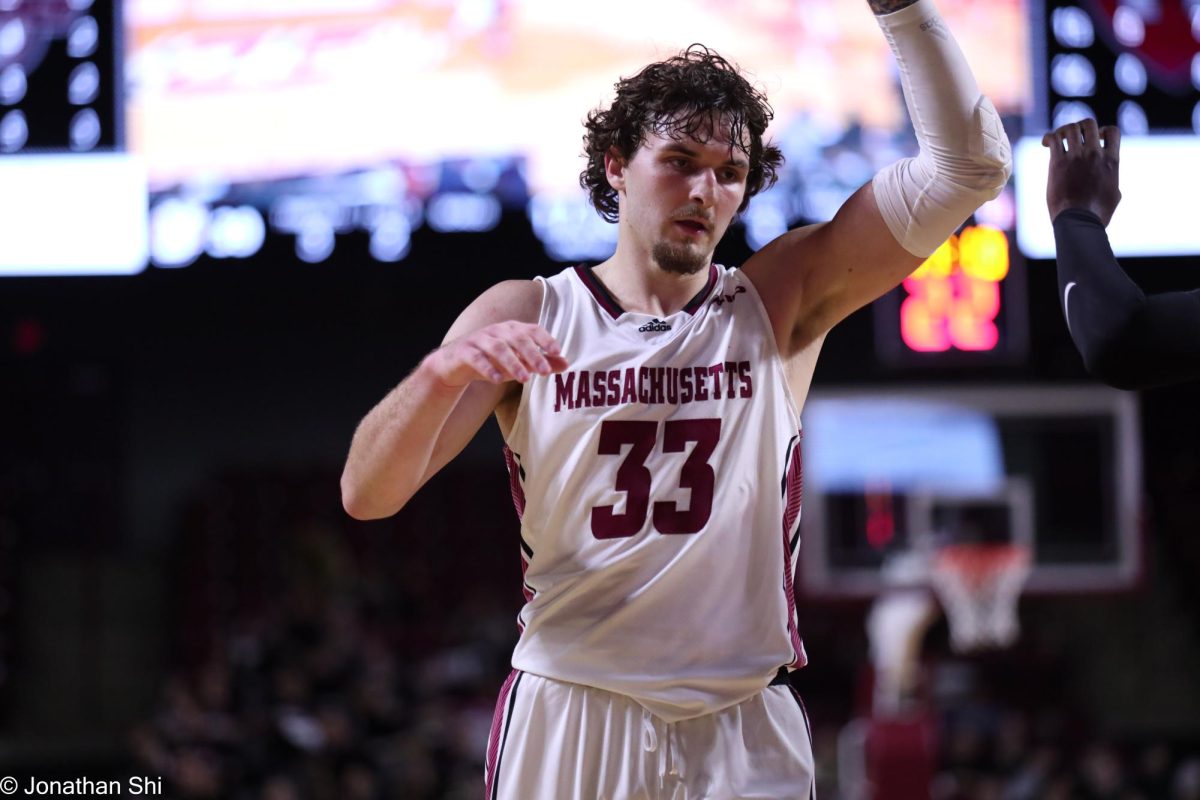
This past week I had the opportunity to participate in the University of Massachusetts’ official sorority recruitment process, for a cost of $20. The process was six days long and consisted of visits and tours of the various sororities, and several rounds of speed-dating-like conversations. On the final day came preference night, where potential new members were given exclusive looks into the chosen chapter’s sisterhood and what it truly means to be part of Greek life.
I was incredibly skeptical of the legitimacy of Greek life going into recruitment. Why did I have to pay over $700 in dues for an unhoused chapter? Does being part of sorority allow me to network with women across the country? Despite the lack of information I had and the stereotypes that I had heard about Greek life, I decided to give it a chance.
I quickly learned that my jeans and a nice blouse were not enough. I was given suggestions to wear “nicer” shoes and a “dressier” necklace. Not only were my clothes not suitable, but I was expected to miss my classes to be able to attend all of the house events. I found it hard to understand that a program that preaches “academia first” was asking me to miss my classes so I wouldn’t face being dropped by the chapter.
But what came hardest to me was being judged on my appearance, race, clothes and how successful I was at being relatable and fun while having a conversation in an overcrowded basement. There was no conversation about my resume or my credentials, because it wasn’t about what I had accomplished or my grade point average. The recruitment process didn’t guarantee that I would get to join a predominantly white, middle-upper class group of girls, but it did guarantee that I left questioning my self-worth and why I did or didn’t fit in.
The argument can be raised that Greek life, including here at UMass, perpetuates classism by attracting students of a certain socioeconomic status, with an informal vetting process enacted simply by having set dues; if you can’t afford them, you cannot join the chapter. Princeton University is one of the few schools that has collected information and data about the Greek system. Their research only furthers the concept that Greek life is discriminatory on the basis of wealth and race. For example, senior surveys of Princeton’s classes of 2009 and 2010 prove that higher-income and white students are far more likely to participate in sororities and fraternities. Princeton’s data revealed that 77 percent of those in sororities and 73 percent of those in fraternities were white, whereas the entire student body was only 51 percent white in 2009.
When taking a step back from the discriminatory issues of Greek life, I do strongly believe that it can be a great outlet for new students who are having a difficult time adjusting. UMass can be hard to navigate and rather intimidating to new, transfer and even multi-year students. Greek life offers students who are having difficulty adjusting to a new place to establish bonds and friendships with people they wouldn’t have otherwise gotten the opportunity to meet. Greek life also helps students get involved with both local and national charities. Whether their philanthropy effort is big or small, they are still enacting the concept of being charitable among college students.
I don’t want to tarnish your opinion of Greek life, but a conversation needs to be had about their archaic and invalid recruitment process. I truly think if certain practices within the system were revised and reformed, there would be less discrimination and students of all backgrounds would be more inclined to join.
Editor’s Note: The photo accompanying this article originally was from Kappa Phi Lambda Sorority. This organization does not participate in Pan-Hellenic practices.
Morgan Reppert is a Collegian columnist and can be reached at [email protected].



















Ed Cutting • Oct 1, 2017 at 2:53 pm
I blame UMass. It talks the talk on social justice but…
nate • Sep 29, 2017 at 4:38 pm
hey everyone in the comments, telling someone that their experience doesn’t matter or saying that they’re lying doesn’t exactly make the thing you’re trying so hard to protect from any disagreement seem all that cool.
greek life member • Sep 29, 2017 at 2:49 pm
As a political science and communications major I appreciate your trial of an ethnography. However, in order to do what you attempted much more time must be spent on such a project. Being on both sides of recruitment is very important to your piece but you only experienced one side and for only 6 days. I am truly sorry that your experience was not good. It should not have been like that. That being said there are many points that I would like to address. Firstly, girls are encouraged to be themselves. That includes what you talk about and what you wear. I did not have formal clothes for recruitment and so I did not wear dresses and I never felt pressured or uncomfortable. Second, academia is extremely import to all greek life. We want all our sisters to succeed and do well in school because that is your primary obligation here at Umass. If you had class you were of course excused from a mocktail as your rho gammas should have and most likely told you. Thirdly, greek life costs money. Whether you have a house or not the sorority has other expenses. Such as apparel for recruitment, philanthropy, and events that are for the sisterhood. It is a community and as such everyone needs to give a little. 🙂 Fourthly, you say “sisterhood for all but the 99%” and I have to strongly disagree. If money is an issue e board is always willing to make it work for you. I have a payment plan and slowly pay my dues without breaking my back or sacrificing more than I feel comfortable. I also feel that you contradict yourself because you say that we did not consider your credentials. If we are to be fair and open and for everyone not just the 1% that means that it shouldn’t matter how high your GPA is or how many extracurricular activities you are in or who you are. I am most definitely not part of the 1%. The mocktails serve the purpose of both the sisterhood and you figuring out where you fit in best with girls who are similar to yourself. Girls who you want to be friends with. Which is why conversations are about everything else but credentials. There are plenty of girls in greek life from many different races (including myself) and of different economic backgrounds. Especially in mine. It is hurtful that you would make all of these assumptions when you only went through recruitment. In order to do a successful ethnography you have to immerse yourself in your project for much longer than 6 days. What you have gotten, unfortunately, is a very superficial and debatable point of view. Greek life isn’t for everyone and that is okay. I didn’t think it was for me but I found an amazing second home.
SittingBull • Sep 29, 2017 at 10:27 am
At the time I went to UMass, only 6% of the entire school population was Greek. All the freaks and geeks and stoners cast all sorts of unfounded aspersions on Greek life. All the negativity by the inert and boring anti-everything student population at that time actually motivated me to try to join and see what it was all about. I made lifelong friends, had a great time, contributed something to the community and had a place of belonging in a sea potheads and miscreants masquerading as university students. Our house was comprised of people from disparate geographic regions, races, creeds, colors and sexual orientation. We literally had guys from the football team and the band in the same house, not to mention many engineers. By and large, my fraternity brothers have gone on to be much more successful than the general UMass population. Was that because of the fraternity? Probably not directly, but I would attribute Greek life to offering something for people of varied interests and who value diversity of thought….not just of skin color or the social movement du jour. The author obviously had a strong bias that she didn’t try too hard to disprove. I am wondering if maybe she went through rush for the purpose of writing this article with this particular slant. It’s no matter. The Greeks won’t care. You might be the one losing out…or not. So much for broadening your horizons.
umassgreek • Sep 28, 2017 at 5:12 pm
I would also like to add- your experience should not have occurred, and that is something that you should address with the Panhellenic council or office of fraternities and sororities so it will not happen again.
umassgreek • Sep 28, 2017 at 4:25 pm
Hello Morgan,
I appreciate you coming on here and voicing your feelings. That is a very brave thing to do, and I am so sorry you had a negative experience with recruitment. However, as someone that has been a member of a sorority at UMass for three years, I would like to have an open and honest conversation about some things that you wrote.
First, I am so so sorry that someone told you you weren’t dressed “well” enough. Girls are supposed to be themselves. I hope it was not someone in any position of authority, as I was a rho gamma and that is not something ever allowed to be said to PNMs nor is it an opinion of the panhellenic council. That absolutely was inappropriate and not something that should have occurred.
Second, school always comes first. Girls who had class and school conflicts were able to be excused from recruitment events. Therefore, it should not have been an issue. Academics are extremely important to greek life.
Third, you mentioned race. However, in my sorority personally, and all others as well, there are girls of all races, ethnicities, and cultural backgrounds. Being at UMass especially, fraternities and sororities are very inclusive. Additionally, I am sorry you perceived any sort of classism. While there are dues, there are payment plans available. No matter their financial background, my chapter will help any member so they can participate. It seems you have been misinformed or misinterpreted some of these things. Understandably so, recruitment is a hectic time.
Thank you for highlighting the positive impacts of greek life following your concerns. I truly appreciate that. I needed to comment to clarify some of the things you may have misinterpreted. Is the greek system perfect? Of course not, as with any organization. Again, I am deeply sorry about your negative experience. Despite that, I am always going to defend a community that has opened its arms to myself and thousands of others with nothing but unconditional love. Thank you.
A • Sep 28, 2017 at 3:49 pm
I can’t believe i’m reading an article full of mistruths, alternative facts, and straight lies. As a woman involved in greek life, all the aspects of sorority recruitment in this “article” could not have been more made up. No one forces you to skip class for recruitment, when I went through it they told me to come later as soon as I could. As for dressing up, we were told to dress appropriately in a business casual style, not that we had to have the most expensive tory burch flats and lilly dresses. As for voting, we are not judging you on looks, we want you to be yourself so you truly feel comfortable and find the best place for you. We always want to recruit girls who were very involved in HS and accomplished a lot. There are many girls in my chapter who don’t come from white, middle class backgrounds. A lot of them work part time jobs to pay for their own dues and make things work. It seems to me that you went into this process with a cynical view, and got even more upset once you didn’t get a bid. I’m sorry you did not have the best experience, but you can’t just lie about the whole process.
Lengel • Sep 28, 2017 at 2:49 pm
I’m going to preface by saying that I can’t speak for the other 6 sororities on campus. As a former sister of IGU (Iota Gamma Upsilon), I know for a FACT that money has absolutely nothing to do with you getting in or not. Our treasurer works with you on payment plans if dues are too expensive for you. I also worked closely with our House Corp on a payment plan for me to pay for rent for my senior year. I know none of the sisters in my chapter would dream of telling you to wear nicer shoes or your clothes weren’t nice enough… we wear pajamas to chapter. We base who we feel should join our house on who gets along best with our sisters and is down to earth, and a genuinely nice woman who isn’t afraid to be herself and is understanding of all the different things people have gone through and who people are at their cores, and accepting them for it. We would never chuck your name away if you decided you wanted to LEARN over coming to a mocktail party; that’s just ridiculous. Caring about your academics, while simultaneously paying a ton of money for it, is commendable. While I understand Greek life and the atmosphere may not be for everyone, I do not appreciate seeing my chapter being dragged through the mud unnecessarily. I do have to throw in, as well, that I met plenty of amazing women in other chapters who held the same qualities that IGU values, and some of them were actually the reason I went through recruitment (wanting to be in their houses). I was lucky enough to find somewhere that I fit in, with a truly remarkable group of women past, present, and future. None of them have been or are what you have put into the above article.
UMass is the best college to attend, in my opinion, and I truly hope that you find an outlet that helps you better navigate and see that.
Iota Love,
Lengel
Maria • Sep 28, 2017 at 1:43 pm
If you are truly interested in Greek life, I would recommend researching the vast offerings that UMass has. Outside of the traditional sororities and fraternities, there are groups like Alpha Phi Omega, which is a co-ed service-based fraternity that is much cheaper and lets everyone in.
Sororities cost money. That’s always been the case. Personally, when I went through, I was able to comfortably pay my own dues through a part-time job, without breaking the bank. Many of them offer payment plans. In life, things cost money. These are all private organizations that do a lot of different things. For example, sororities pay for the room spaces at UMass that they rent out. Chapters also budget for their philanthropy events, recruitment events, alumni events, and they pay their national organization to send out staff to put on workshops and help with recruitment. Many sororities also do things like sisterhood retreats, where they may go away for the night somewhere or do a fun activity covered by the sorority without charging the women additional costs. It’s not a scheme to “perpetuate classism” or keep certain people out, it’s just reality that things cost money and not everything can be free. Another example, the $20 you paid for recruitment covers the buses that drive everyone around.